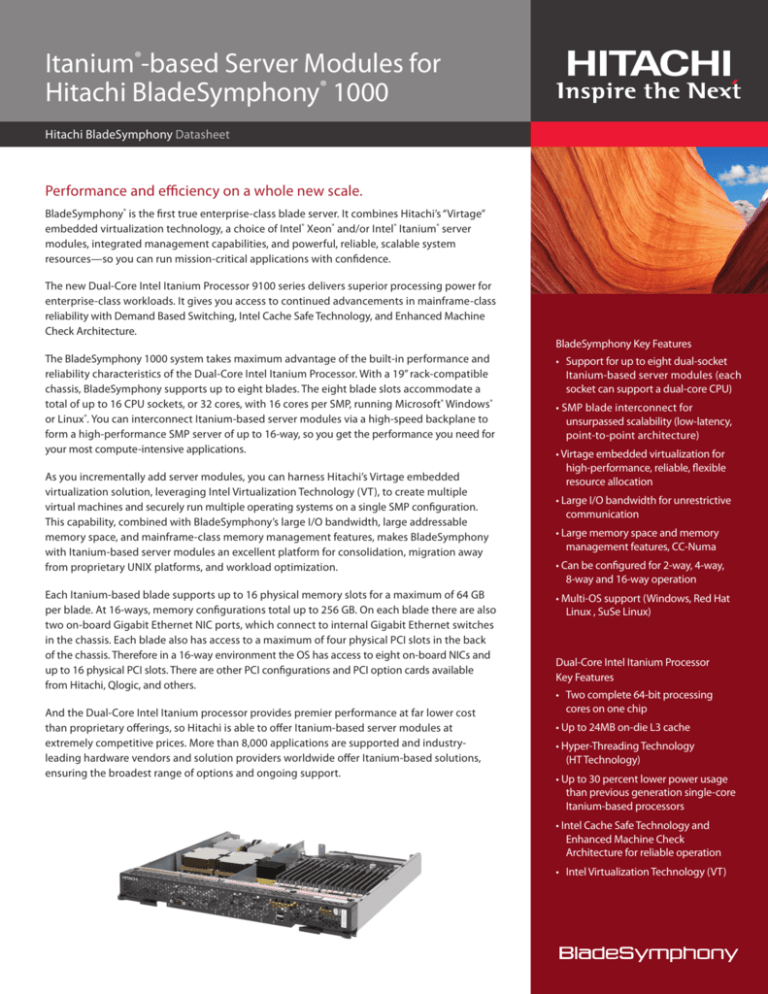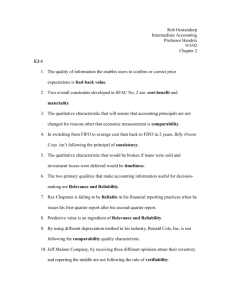
Itanium®-based Server Modules for
Hitachi BladeSymphony® 1000
Hitachi BladeSymphony Datasheet
Performance and efficiency on a whole new scale.
BladeSymphony® is the first true enterprise-class blade server. It combines Hitachi’s “Virtage”
embedded virtualization technology, a choice of Intel® Xeon® and/or Intel® Itanium® server
modules, integrated management capabilities, and powerful, reliable, scalable system
resources—so you can run mission-critical applications with confidence.
The new Dual-Core Intel Itanium Processor 9100 series delivers superior processing power for
enterprise-class workloads. It gives you access to continued advancements in mainframe-class
reliability with Demand Based Switching, Intel Cache Safe Technology, and Enhanced Machine
Check Architecture.
The BladeSymphony 1000 system takes maximum advantage of the built-in performance and
reliability characteristics of the Dual-Core Intel Itanium Processor. With a 19” rack-compatible
chassis, BladeSymphony supports up to eight blades. The eight blade slots accommodate a
total of up to 16 CPU sockets, or 32 cores, with 16 cores per SMP, running Microsoft® Windows®
or Linux®. You can interconnect Itanium-based server modules via a high-speed backplane to
form a high-performance SMP server of up to 16-way, so you get the performance you need for
your most compute-intensive applications.
As you incrementally add server modules, you can harness Hitachi’s Virtage embedded
virtualization solution, leveraging Intel Virtualization Technology (VT), to create multiple
virtual machines and securely run multiple operating systems on a single SMP configuration.
This capability, combined with BladeSymphony’s large I/O bandwidth, large addressable
memory space, and mainframe-class memory management features, makes BladeSymphony
with Itanium-based server modules an excellent platform for consolidation, migration away
from proprietary UNIX platforms, and workload optimization.
Each Itanium-based blade supports up to 16 physical memory slots for a maximum of 64 GB
per blade. At 16-ways, memory configurations total up to 256 GB. On each blade there are also
two on-board Gigabit Ethernet NIC ports, which connect to internal Gigabit Ethernet switches
in the chassis. Each blade also has access to a maximum of four physical PCI slots in the back
of the chassis. Therefore in a 16-way environment the OS has access to eight on-board NICs and
up to 16 physical PCI slots. There are other PCI configurations and PCI option cards available
from Hitachi, Qlogic, and others.
And the Dual-Core Intel Itanium processor provides premier performance at far lower cost
than proprietary offerings, so Hitachi is able to offer Itanium-based server modules at
extremely competitive prices. More than 8,000 applications are supported and industryleading hardware vendors and solution providers worldwide offer Itanium-based solutions,
ensuring the broadest range of options and ongoing support.
BladeSymphony Key Features
• Support for up to eight dual-socket
Itanium-based server modules (each
socket can support a dual-core CPU)
• SMP blade interconnect for
unsurpassed scalability (low-latency,
point-to-point architecture)
• Virtage embedded virtualization for
high-performance, reliable, flexible
resource allocation
• Large I/O bandwidth for unrestrictive
communication
• Large memory space and memory
management features, CC-Numa
• Can be configured for 2-way, 4-way,
8-way and 16-way operation
• Multi-OS support (Windows, Red Hat
Linux , SuSe Linux)
Dual-Core Intel Itanium Processor
Key Features
• Two complete 64-bit processing
cores on one chip
• Up to 24MB on-die L3 cache
• Hyper-Threading Technology
(HT Technology)
• Up to 30 percent lower power usage
than previous generation single-core
Itanium-based processors
• Intel Cache Safe Technology and
Enhanced Machine Check
Architecture for reliable operation
• Intel Virtualization Technology (VT)
Itanium®-based Server Module Specifications
CPU
CPU (Frequency/Cache)
Dual-Core Intel® Itanium® Processor 9100 Series (1.66GHz/L3 24MB, 1.66GHz/L3 18MB, 1.42GHz/L3 12MB)
Dual-Core Intel® Itanium® Processor 9000 Series (1.6GHz/L3 24MB, 1.6GHz/L3 18MB, 1.4GHz/L3 12MB)
# of CPU
2 sockets
Chipset
Front Side Bus Frequency (FSB)
Hitachi Node Controller
400MHz / 667MHz
SMP Configuration
Max. 16way (8 sockets SMP)
Memory
DIMM
512MB/1GB/2GB/4GB DDR2-400MHz
Error Correction
ECC
Availability
Online Spare / Chip kill / Scrubbing
# of slots
16
Capacity
Min. 2GB (512MB×4 slots) / Max. 64GB (4GB×16 slots)
Onboard
LAN
LAN
Mgmt
LAN
Interface
Interface
1000Base-T/100Base-TX/10Base-T
WOL
Port 1, 2 support
Power Management
APM
Interface
100Base-TX/10Base-T
Connector
USB1.1 x 2 / Serial x 1
LED
Condition, Power, Error, SMP Partition
Switch
Power, Reset, NMI
Backplane
LAN(1000Base-T/100Base-TX/10Base-T)[SERDES]×2, PCI Express×4×2
Hitachi proprietary SMP node link x 3, Management LAN (100Base-TX/10Base-T)×1 (*1)
Microsoft® Windows Server® 2003 Enterprise Edition for Itanium based Systems SP2
Microsoft® Windows Server® 2008 for Itanium based Systems SP2
Support
OS
Red Hat Enterprise Linux 4
Additional
Features
Console Redirection over LAN
Red Hat Enterprise Linux 5
Local PXE boot
WOL right after AC power on (Controlled by BMC)
IOA Type3 Hitachi FC & Ether Combo Board
Hitachi America, Ltd.
Server Systems Group
2000 Sierra Point Parkway
Brisbane, CA 94005-1836
ph. 1.866.HITACHI
email: ServerSales@hal.hitachi.com
web: www.BladeSymphony.com
©2008 Hitachi America, Ltd. All rights reserved. Descriptions and specifications contained in this document are subject to change without notice and may differ from country to country. Hitachi is a registered
trademark of Hitachi, Ltd. and/or its affiliates. BladeSymphony is a registered trademark of Hitachi, Ltd. in the United States. Intel, Itanium and Xeon are trademarks or registered trademarks of Intel Corporation or its
subsidiaries in the United States and other countries. Linux is a registered trademark or trademark of Linus Torvalds in the United States and other countries. “Red Hat,” Red Hat Linux are trademarks or registered
trademarks of Red Hat, Inc. in the US and other countries. UNIX is a registered trademark in the United States and other countries, exclusively licensed through X/Open Company, Ltd. Windows is the registered
trademark of Microsoft Corporation in the United States and other countries. Other trademarks, service marks, company names may be trademarks or registered trademarks of their respective owners.
Part number GVAX64A3 GVAX65A3 GVAX64V3 GVAX65V3 GVAX65A4 GVAX65V4. 12/08







